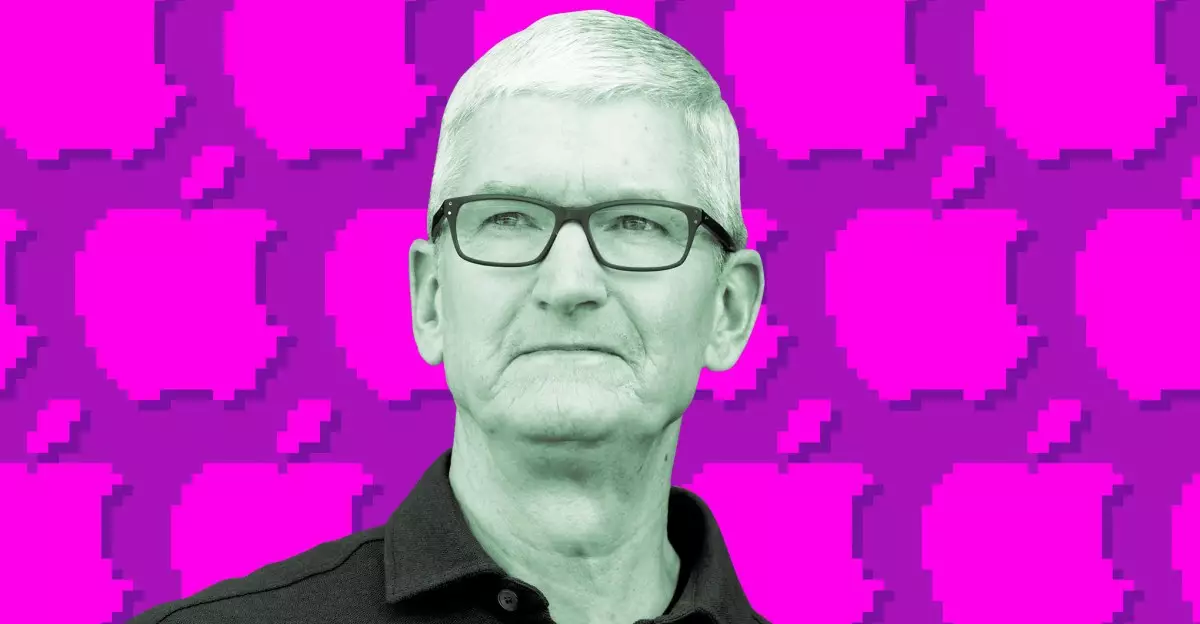In a rare and revealing all-hands meeting, Apple’s CEO Tim Cook laid out a compelling vision that positions artificial intelligence as a transformative force akin to the internet, smartphones, and cloud computing. His unwavering stance underscores a strategic shift, suggesting that Apple sees AI not just as a feature but as a cornerstone of future innovation. Cook’s declaration that “Apple must do this” reflects a sense of urgency and purpose, signaling that the company intends to lead rather than follow in the AI revolution. His comparison of this technological upheaval to past giants hints at a desire to replicate Apple’s historical pattern of pioneering even in uncharted territory, despite being late to initial waves of AI development.
What is particularly striking is Cook’s framing of AI as an “opportunity that’s ours to grab.” This perspective implicitly acknowledges past hesitations and slow progress, yet emphasizes resolute commitment. Apple’s history of waiting—sometimes delaying or cautiously approaching new frontiers—has often allowed competitors to gain early advantages. Now, Cook appears determined to ensure that Apple takes control of AI’s evolution on its own terms. The emphasis on investment and initiative is a clear message to both internal teams and shareholders: AI is a strategic priority that will define Apple’s future path of growth and innovation.
Overcoming Hurdles: Innovation Through Strategic Redirection
Behind the optimistic rhetoric, Apple faces tangible challenges in translating its AI ambitions into reality. The delays in integrating advanced AI features like Siri, originally envisioned with a hybrid architecture combining traditional systems and large language models (LLMs), exemplify internal struggles to align technological visions with quality standards. Software chief Craig Federighi candidly discussed how initial plans didn’t meet Apple’s high bar, prompting a complete overhaul. Moving all functions to a new architecture indicates a willingness to rewrite the playbook to achieve the quality Apple consumers expect.
This pivot reveals an internal culture that values excellence over expediency. While competitors such as Meta aggressively pursuit AI talent—sometimes at the expense of stability—Apple’s cautious approach signals a strategic desire to maintain its reputation for quality and user experience. Losing some AI personnel to Meta underscores the fierce competition for talent in this space, but it also raises questions about whether Apple’s cautious tactics might impede the rapid innovation needed to stay ahead.
Critically, Apple’s slower pace in deploying advanced AI tools has been a perceived weakness, leaving market share and user engagement vulnerable to more nimble rivals. However, the decision to fundamentally rethink their architecture demonstrates that Apple isn’t willing to rush products that compromise their famously high standards. This deft balancing act—between speed, quality, and strategic foresight—will likely determine whether Apple’s renewed AI ambitions succeed or falter.
Leadership and the Quest for AI Supremacy
Tim Cook’s leadership in emphasizing AI as a “big or bigger” evolution than previous technological milestones underlines a confidence that Apple can redefine its role in the AI space. While Apple may have been perceived as a cautious newcomer, Cook’s rhetoric suggests the company intends to play catch-up and eventually lead. His acknowledgment that Apple has historically been late to the game, yet capable of shaping the “modern” versions of revolutionary products, reflects a resilient confidence.
However, this bold positioning comes with risks. The AI landscape is fiercely competitive, with tech giants investing billions into breakthroughs, talent acquisition, and infrastructure. Apple’s approach—deliberate, quality-focused, and architecturally ambitious—might paradoxically slow their race to market but could produce AI features tailored to their distinctive ecosystem and user base. Whether this strategy will pay off depends largely on execution and whether Apple’s emphasis on quality can outweigh the advantage of faster, less refined offerings from rivals.
In essence, Apple’s renewed AI commitment signals a bold bid to carve out a future where they’re not just participants but leaders. If they can overcome internal and external hurdles, the company might redefine innovation standards once again—ushering in a new era where AI significantly enhances user experience on their terms.

